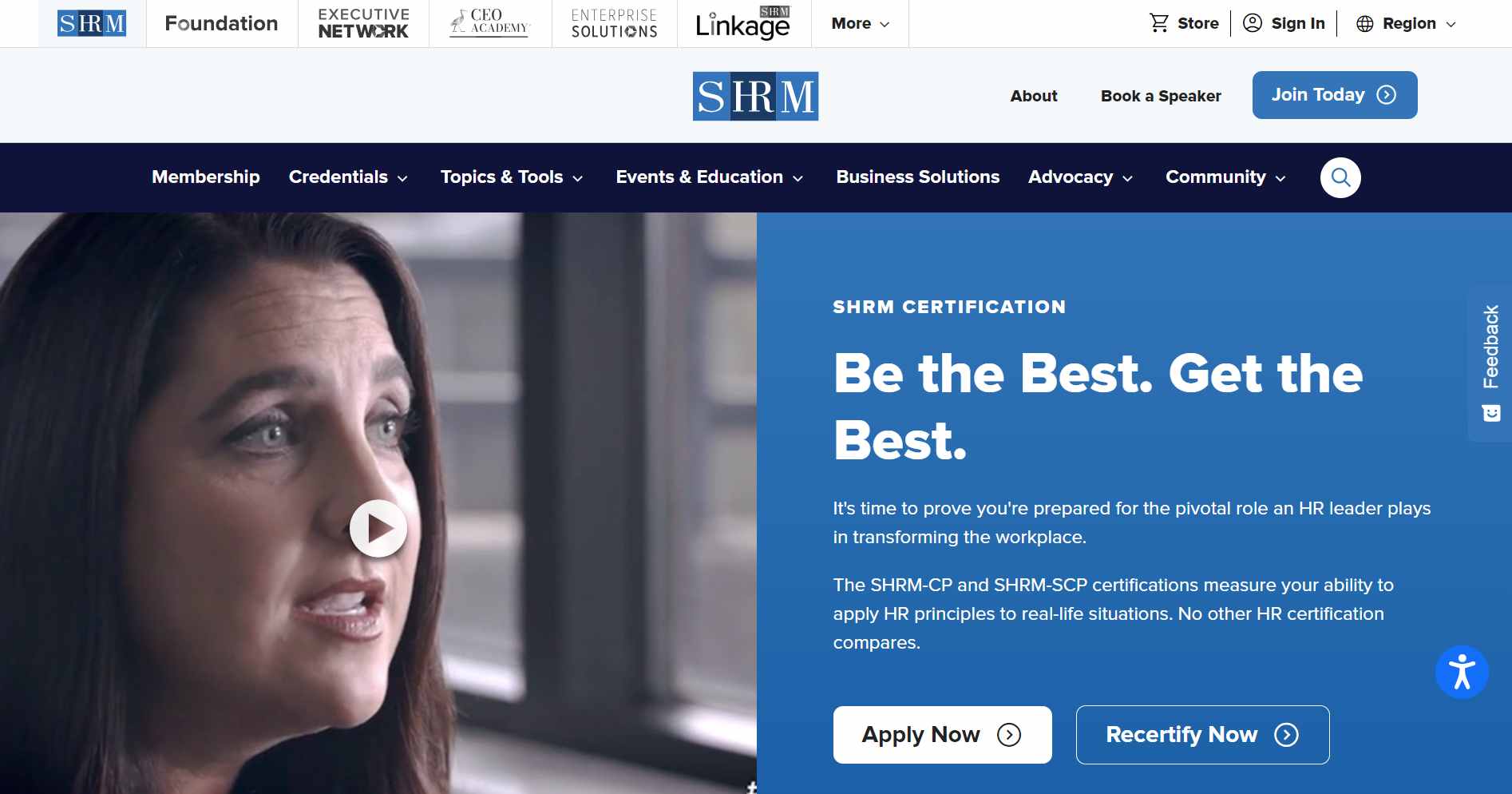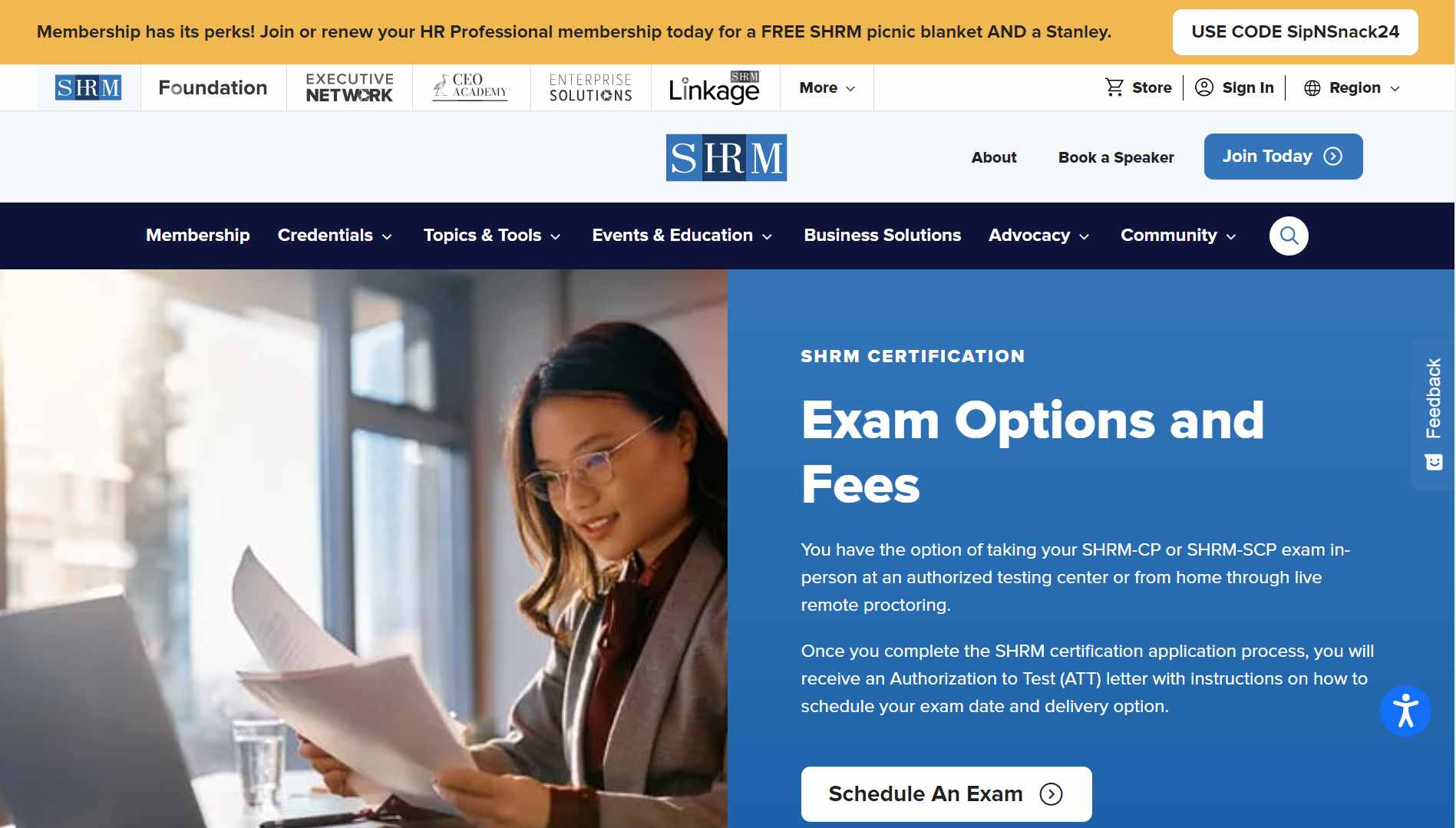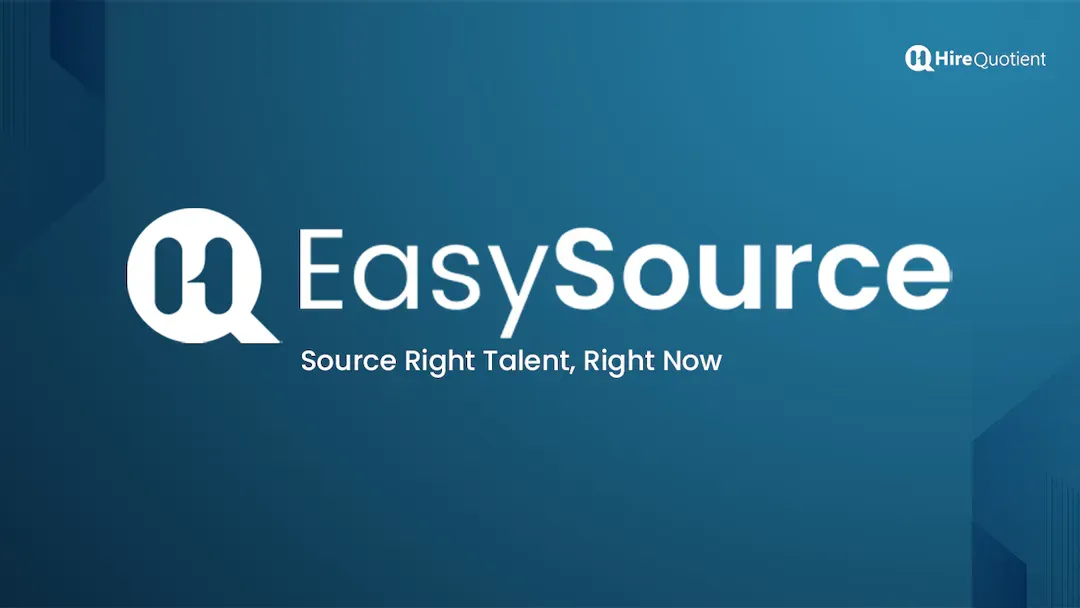SHRM Certificate: How to become SHRM certified
Published on July 6th, 2024
Standing out in the field of human resources requires more than just experience. It demands a commitment to ongoing education and professional development. One of the most effective ways to demonstrate your dedication and expertise is by obtaining a certification from a reputable organization. The Society for Human Resource Management (SHRM) offers some of the most recognized and respected certifications in the HR industry. These certifications not only validate your skills and knowledge but also signal to employers that you are committed to staying current with best practices and emerging trends.
Imagine walking into a job interview with a SHRM certification on your resume. It immediately sets you apart, showing that you have met rigorous standards and are equipped with the latest HR knowledge. Whether you are just starting your career or looking to advance to a senior position, SHRM certifications can open doors to new opportunities, higher salaries, and greater professional recognition.
But what exactly is SHRM certification, and why is it so valued? How much does it cost, and what are the requirements to obtain it? This comprehensive guide will answer these questions and more, providing you with all the information you need to understand and pursue SHRM certification. From the different types of certifications available to the benefits they offer, the costs involved, and the preparation required, we will cover everything you need to know to make an informed decision about your professional development.
So, whether you are an aspiring HR professional aiming to build a solid foundation or a seasoned expert looking to validate your expertise and take your career to the next level, read on to discover how SHRM certification can help you achieve your goals.
What is SHRM Certification?

SHRM certification is a globally recognized credential that validates an HR professional's skills, knowledge, and abilities. It demonstrates a commitment to the HR profession and a mastery of the competencies and knowledge required to be effective in the field. The two main types of SHRM certification are:
- SHRM-CP (Certified Professional): This certification is designed for HR professionals who are involved in the day-to-day operational roles of human resources. These professionals are responsible for implementing policies and strategies, serving as points of contact for staff and stakeholders, delivering HR services, and performing operational HR functions. The SHRM-CP certification ensures that these professionals have the necessary knowledge to effectively manage and execute HR tasks, ensuring the smooth functioning of HR operations within an organization.
- SHRM-SCP (Senior Certified Professional): This certification is aimed at senior HR professionals who have a more strategic role within their organizations. These individuals are responsible for developing HR strategies, leading the HR function, fostering influence within the community, analyzing performance metrics, and aligning HR strategies with the overall goals of the organization. The SHRM-SCP certification ensures that these senior professionals have the advanced knowledge and strategic insight necessary to lead and innovate within the HR field.
Both certifications are built around the SHRM Body of Competency and Knowledge (BoCK), which includes behavioral competencies and HR knowledge needed to be a successful HR professional.
Suggested reads: HR Certifications You Must Know About
Benefits of SHRM Certification
Earning a SHRM certification offers numerous benefits that can significantly impact your career and professional development:
- Professional Recognition: SHRM certification is a mark of professional excellence recognized by employers globally. It demonstrates that you have met rigorous standards and possess the knowledge and skills required to excel in the HR field. This recognition can set you apart from other candidates in job applications and promotions.
- Career Advancement: Holding a SHRM certification can open doors to new job opportunities, promotions, and higher salaries. Employers often prefer or require SHRM-certified candidates for HR roles, as the certification ensures a standard of competency and professionalism.
- Skill Enhancement: The certification process helps you gain a deeper understanding of HR practices and principles. It covers a wide range of topics, from employee relations to strategic management, ensuring that you are well-rounded in all aspects of HR. This comprehensive knowledge can enhance your ability to perform effectively in your current role and prepare you for more advanced responsibilities.
- Networking Opportunities: Being part of the SHRM community gives you access to a network of HR professionals and resources. This network can be invaluable for career development, offering opportunities for mentoring, professional advice, and collaboration. You can connect with other SHRM-certified professionals, attend SHRM conferences and events, and participate in local SHRM chapters.
- Continuous Learning: SHRM certification requires ongoing professional development, ensuring that you stay current with the latest HR trends, laws, and best practices. This commitment to continuous learning helps you remain relevant and effective in your role, keeping your skills and knowledge up to date.
- Increased Confidence: Achieving SHRM certification can boost your confidence as an HR professional. The rigorous preparation and examination process validate your expertise, assuring you that you possess the skills and knowledge needed to succeed in your career.
- Global Recognition: SHRM certification is recognized and respected worldwide. Whether you are seeking opportunities within your home country or internationally, SHRM certification can enhance your employability and professional credibility across borders.
By obtaining SHRM certification, you demonstrate your dedication to the HR profession and your commitment to maintaining high standards of excellence. This can lead to greater job satisfaction, improved job performance, and a more fulfilling career in human resources.
SHRM Certification Requirements
To pursue SHRM certification, candidates must meet specific eligibility requirements, which vary based on the certification level (SHRM-CP or SHRM-SCP) and the candidate's education and experience. Here is a detailed overview of the requirements for each certification level:
SHRM-CP (Certified Professional) Requirements
The SHRM-CP certification is designed for HR professionals who are engaged in operational roles. The eligibility criteria for the SHRM-CP certification include a combination of educational background and professional HR experience:
- Educational Background:
- HR-related bachelor's degree: 1 year in an HR role.
- Non-HR bachelor's degree: 2 years in an HR role.
- HR-related master’s degree: Currently in an HR role.
- Non-HR master’s degree: 1 year in an HR role.
- Less than a bachelor's degree (includes associate degrees and other non-degree programs): 3 years in an HR role.
- Professional HR Experience:
- Candidates must have worked in an HR role for a specified number of years, depending on their highest level of education.
- The experience must be within a professional-level HR position where the primary responsibilities involve HR management or execution.
SHRM-SCP (Senior Certified Professional) Requirements
The SHRM-SCP certification is aimed at senior HR professionals who have a strategic role within their organizations. The eligibility criteria for the SHRM-SCP certification also include a combination of educational background and professional HR experience:
- Educational Background:
- HR-related bachelor's degree: 4 years in an HR role.
- Non-HR bachelor's degree: 5 years in an HR role.
- HR-related master’s degree: 3 years in an HR role.
- Non-HR master’s degree: 4 years in an HR role.
- Less than a bachelor's degree (includes associate degrees and other non-degree programs): 6 years in an HR role.
- Professional HR Experience:
- Candidates must have worked in an HR role for a specified number of years, depending on their highest level of education.
- The experience must be within a senior HR position where the primary responsibilities involve strategic HR management, leadership, and decision-making.
General Requirements for Both SHRM-CP and SHRM-SCP
- HR-related Education and Training: Candidates are encouraged to have completed coursework or training in HR-related subjects, which can include degrees, certificates, and other professional development programs.
- Professional Membership: While not a strict requirement, being a member of SHRM or a local SHRM chapter can provide valuable resources and support throughout the certification process.
- Commitment to HR Professionalism: Candidates must adhere to the SHRM Code of Ethics and demonstrate a commitment to professional HR practices and continuous learning.
How to Apply for SHRM Certification
The application process for SHRM certification involves several steps:
- Review Eligibility Requirements: Ensure that you meet the educational and professional experience requirements for the certification level you are pursuing.
- Gather Documentation: Collect all necessary documentation, such as transcripts, employment verification, and professional development records, to support your application.
- Complete the Application: Fill out the SHRM certification application form, providing detailed information about your educational background, work experience, and professional achievements.
- Submit the Application: Submit your completed application along with the required fees to SHRM for review.
- Prepare for the Exam: Once your application is approved, begin studying for the certification exam using SHRM’s official study materials and resources.
- Schedule the Exam: Choose a convenient exam date and location from the available options provided by SHRM.
- Take the Exam: Successfully pass the SHRM certification exam to earn your SHRM-CP or SHRM-SCP credential.
By meeting these requirements and completing the certification process, you will join a distinguished group of HR professionals who hold the SHRM certification, enhancing your career prospects and demonstrating your expertise in the field of human resources.
SHRM Certification Cost
The cost of SHRM certification can vary depending on whether you are a SHRM member or not. Understanding these costs is crucial for budgeting your professional development. Here’s a detailed breakdown:
Exam Fees
- SHRM Members: The exam fee for SHRM members is approximately $300-$400. Membership offers a discounted rate, making it a cost-effective option for those who plan to take the exam.
- Non-Members: For non-members, the exam fee ranges from $400-$500. While this is higher than the member rate, it provides the same access to the certification exam.
Additional Costs
- Preparation Courses: Many candidates opt to enroll in SHRM preparation courses to enhance their chances of passing the exam. These courses can vary in price:
- SHRM Learning System: Approximately $950-$1,200 for members and $1,200-$1,500 for non-members.
- University or Third-Party Courses: Costs can range from $500 to $2,000 depending on the provider and the comprehensiveness of the course.
- Study Materials: SHRM offers official study materials, including books, practice tests, and online resources. The cost for these materials typically ranges from $200 to $500, depending on the package chosen.
- Recertification Fees: SHRM certification is valid for three years. To maintain the certification, professionals must earn 60 Professional Development Credits (PDCs) or retake the certification exam. The recertification fee is approximately $100-$150 for members and $150-$200 for non-members.
- Membership Fees: While not mandatory, becoming a SHRM member provides access to discounted exam fees and other valuable resources. The annual membership fee is approximately $219, with additional costs for local chapter memberships which can range from $25 to $50 per year.
- Additional Resources and Workshops: SHRM often offers additional workshops, webinars, and resources that can aid in exam preparation. These can range from $50 to $300 per session.
Financial Planning for SHRM Certification
To manage the costs associated with SHRM certification, consider the following tips:
- Budget Early: Start budgeting for the exam and associated costs well in advance. Include exam fees, preparation courses, study materials, and membership fees in your budget.
- Employer Sponsorship: Many employers offer professional development benefits that can cover the cost of certification exams and preparation courses. Check with your HR department to see if your employer provides financial support for SHRM certification.
- Payment Plans: Some preparation course providers offer payment plans that allow you to spread the cost over several months, making it easier to manage financially.
- Scholarships and Grants: Explore scholarships and grants available for HR professionals pursuing certification. SHRM and other HR organizations occasionally offer financial assistance to help offset certification costs.
By understanding the full scope of the costs involved and planning accordingly, you can make an informed decision about pursuing SHRM certification and ensure that you are financially prepared for this valuable investment in your professional development.
SHRM-CP Certification
The SHRM-CP (Certified Professional) certification is designed for HR professionals who are involved in the operational aspects of human resource management. This certification focuses on the practical application of HR knowledge and skills to solve real-world problems and enhance organizational effectiveness. Here’s a detailed look at what the SHRM-CP certification entails:
Key Focus Areas of the SHRM-CP Certification
The SHRM-CP exam covers a wide range of topics that are essential for HR professionals working at the operational level. These topics are categorized into four main areas:
- HR Competencies:
- Leadership: Understanding how to lead and manage HR functions effectively, fostering a positive workplace culture, and guiding teams toward achieving organizational goals.
- Ethical Practice: Ensuring that HR practices and policies adhere to ethical standards and promote fairness and integrity within the organization.
- Business Acumen: Gaining a strong understanding of business principles, including financial management, strategic planning, and organizational dynamics, to align HR strategies with business objectives.
- People:
- Talent Acquisition: Strategies and practices for attracting, recruiting, and onboarding new employees to meet organizational needs.
- Employee Engagement: Techniques for fostering a motivated, committed, and productive workforce through effective communication, recognition, and development programs.
- Learning and Development: Creating and managing training programs that enhance employees' skills and support their career growth, ensuring that the organization has the talent needed to succeed.
- Organization:
- Structure: Understanding organizational design and development, including creating and implementing structures that support business objectives and enhance efficiency.
- Workforce Management: Managing workforce planning, deployment, and optimization to ensure that the organization has the right people in the right roles at the right time.
- Technology Management: Leveraging HR technology and systems to improve HR processes, data management, and decision-making.
- Workplace:
- Diversity and Inclusion: Promoting a diverse and inclusive workplace that values and leverages differences to drive innovation and performance.
- Risk Management: Identifying, assessing, and mitigating risks related to HR practices, compliance, and employee relations.
- Corporate Social Responsibility: Implementing policies and practices that support ethical business conduct, environmental sustainability, and social responsibility.
Preparing for the SHRM-CP Exam
Achieving SHRM-CP certification requires thorough preparation and a clear understanding of the exam content. Here are some steps to help you prepare effectively:
- Review the SHRM Body of Competency and Knowledge (BoCK): The BoCK outlines the competencies and knowledge areas covered in the SHRM-CP exam. Familiarize yourself with these to understand the scope of the exam.
- Utilize Official SHRM Study Materials: SHRM offers a variety of study resources, including the SHRM Learning System, which provides comprehensive coverage of the exam content through books, online modules, and practice tests.
- Join a Study Group: Participating in a study group can provide support, motivation, and valuable insights from peers who are also preparing for the exam.
- Attend SHRM Preparation Courses: Many universities and training providers offer SHRM-CP preparation courses that provide structured learning and expert guidance.
- Practice Time Management: Create a study schedule that allows you to cover all topics systematically and includes time for review and practice exams.
- Take Practice Exams: Practice exams can help you become familiar with the exam format and question types, as well as identify areas where you need further study.
By focusing on these key areas and following a structured preparation plan, you can increase your chances of passing the SHRM-CP exam and advancing your HR career. The SHRM-CP certification not only validates your expertise in operational HR but also positions you as a valuable asset to your organization.
SHRM Certification Programs and Courses
To help candidates prepare for the SHRM certification exams, various SHRM certificate programs and courses are available. These programs offer comprehensive training based on the SHRM Body of Competency and Knowledge (BoCK) and provide valuable resources to ensure candidates are well-prepared for the exams. Here are some key features of these programs and courses:
- SHRM Learning System:
- Comprehensive Study Modules: The SHRM Learning System includes interactive online modules that cover all aspects of the SHRM BoCK. These modules are designed to help candidates understand and retain key concepts.
- Practice Exams: The system provides practice exams that mimic the format and difficulty of the actual certification exams, allowing candidates to assess their readiness and identify areas for improvement.
- Study Guides: Detailed study guides and reading materials are included to support self-paced learning.
- Mobile Accessibility: The SHRM Learning System is accessible via mobile devices, allowing candidates to study on the go.
- University and Third-Party Courses:
- Many universities and training providers offer SHRM certification preparation courses. These courses often include classroom instruction, online learning, and interactive workshops.
- Instructor-Led Training: Courses are typically led by experienced HR professionals who provide expert guidance and support.
- Interactive Learning Experiences: Candidates can participate in discussions, case studies, and group activities to enhance their understanding of HR concepts.
- SHRM Seminars and Workshops:
- SHRM offers various seminars and workshops focused on specific areas of HR that are covered in the certification exams. These sessions provide in-depth training and practical insights.
- Networking Opportunities: Attending SHRM seminars and workshops allows candidates to network with other HR professionals and share best practices.
- Online Courses and Webinars:
- SHRM provides a range of online courses and webinars that offer flexible learning options. These courses cover key topics in the SHRM BoCK and are designed to fit into busy schedules.
- Self-Paced Learning: Candidates can complete the courses at their own pace, making it easier to balance study with work and other commitments.
By utilizing these SHRM certification programs and courses, candidates can gain the knowledge and skills needed to succeed on the certification exams and advance their HR careers.
SHRM Certification Cost and Fees
Understanding the SHRM certification cost is crucial for budgeting your professional development. The exam fees vary based on membership status, with additional expenses for study materials and prep courses. Here is a detailed breakdown of the costs associated with SHRM certification:
- Exam Fees:
- SHRM Members: For SHRM members, the exam fee is approximately $300-$400. Membership provides a discounted rate, making it a cost-effective option for those pursuing certification.
- Non-Members: For non-members, the exam fee ranges from $400-$500. While this fee is higher than the member rate, it grants access to the same certification exam.
- Preparation Courses and Study Materials:
- SHRM Learning System: The SHRM Learning System costs approximately $950-$1,200 for members and $1,200-$1,500 for non-members. This comprehensive system includes study modules, practice exams, and study guides.
- University and Third-Party Courses: Preparation courses offered by universities and third-party providers can range from $500 to $2,000, depending on the provider and the comprehensiveness of the course.
- Study Guides and Materials: Official SHRM study guides and materials typically cost between $200 and $500, depending on the package chosen.
- Recertification Fees:
- Recertification: SHRM certification is valid for three years. To maintain your credentials, you must earn 60 Professional Development Credits (PDCs) or retake the certification exam. The recertification fee is approximately $100-$150 for members and $150-$200 for non-members.
- Membership Fees:
- SHRM Membership: While not mandatory, becoming a SHRM member provides access to discounted exam fees and additional resources. The annual membership fee is approximately $219, with additional costs for local chapter memberships, which can range from $25 to $50 per year.
- Additional Resources and Workshops:
- SHRM offers various workshops, webinars, and additional resources to aid in exam preparation. These can range from $50 to $300 per session, providing valuable insights and learning opportunities.
Financial Planning for SHRM Certification
To manage the costs associated with SHRM certification, consider the following tips:
- Budget Early: Start budgeting for the exam and associated costs well in advance. Include exam fees, preparation courses, study materials, and membership fees in your budget.
- Employer Sponsorship: Many employers offer professional development benefits that can cover the cost of certification exams and preparation courses. Check with your HR department to see if your employer provides financial support for SHRM certification.
- Payment Plans: Some preparation course providers offer payment plans that allow you to spread the cost over several months, making it easier to manage financially.
- Scholarships and Grants: Explore scholarships and grants available for HR professionals pursuing certification. SHRM and other HR organizations occasionally offer financial assistance to help offset certification costs.
By understanding the full scope of the costs involved and planning accordingly, you can make an informed decision about pursuing SHRM certification and ensure that you are financially prepared for this valuable investment in your professional development.
SHRM Certification Requirements and Eligibility
The SHRM certification requirements include a combination of education and professional experience. For the SHRM-CP certification, candidates typically need at least one year of experience in an HR role if they hold a graduate degree in HR. Those with an undergraduate degree require two years of experience, while those with less formal education need more extensive experience.
Preparing for SHRM Certification
Preparing for the SHRM certification exam requires a strategic approach. Here are some tips:
- Understand the Exam Format: Familiarize yourself with the exam structure and types of questions.
- Study Resources: Utilize SHRM's official study materials, online courses, and practice exams.
- Join Study Groups: Engage with other HR professionals preparing for the exam to share insights and study tips.
- Time Management: Create a study schedule that allows you to cover all topics systematically.
SHRM Certification Exam Dates

It's essential to keep track of SHRM certification exam dates to plan your preparation effectively. Exam windows are typically offered twice a year, in the spring and winter. Make sure to register early to secure your preferred testing date.
Conclusion
Achieving SHRM certification can be a significant milestone in your HR career, offering numerous professional benefits and opportunities for growth. By understanding what SHRM certification entails, meeting the eligibility requirements, and preparing effectively, you can enhance your career prospects and demonstrate your commitment to excellence in the HR field.
Whether you're considering the SHRM-CP certification or looking into the costs and requirements, this comprehensive guide provides the information you need to embark on your SHRM certification journey.
In today's competitive recruitment landscape, finding the right talent quickly and efficiently is crucial. Thus,
Introducing EasySource by HireQuotient
EasySource, powered by HireQuotient, is the most advanced candidate-sourcing software designed to streamline your hiring process and help you secure the best candidates effortlessly.

Source Right Talent, Right Now
EasySource is built to tackle the toughest recruitment challenges, whether you're hiring for entry-level positions or executive roles. This software ensures that you always find the best talent, every single time.
Effortless Candidate Sourcing
EasySource’s innovative candidate discovery module uses simple prompts or your job description to source relevant candidates from both active and hidden talent pools. By leveraging multiple high-intent signals, EasySource identifies candidates who are genuinely interested in joining your organization.
Magical Candidate Screening
If you're overwhelmed by a large volume of applicants, EasySource’s persona-based Candidate Screening Module is here to help. It screens candidates based on qualitative and quantitative nuances beyond the job description, allowing your recruiters to focus only on the most qualified candidates.
Engage Candidates at Scale
Crafting personalized outreach messages can be time-consuming. EasySource’s Candidate Engagement Module reads candidate profiles and aligns them with your job description to create highly personalized messages. This ensures that candidates understand why they are an excellent fit for your role, enhancing engagement and response rates.
Rediscover Talent from Your Internal Pool
With its easy-click integration capabilities, EasySource can identify and screen relevant candidates from your internal talent pool. It engages these candidates with hyper-personalized messaging across multiple channels, bringing them into your recruitment pipeline efficiently.
Seamless Integration
EasySource integrates seamlessly into your existing tech stack. Its bi-directional integration with any ATS ensures a smooth talent-sourcing experience, making it an indispensable tool for modern recruiters.

Ready to find your rockstar candidates? EasySource will help you discover hundreds of ideal candidates tailored to your requirements. Book a demo today and experience the future of candidate sourcing with EasySource by HireQuotient.
With EasySource, sourcing, screening, and engaging top talent has never been easier. Enhance your recruitment strategy and build a stronger team with the most advanced candidate sourcing software available.
Frequently Asked Questions on SHRM Certification
What is SHRM Certification?
SHRM certification is a globally recognized credential offered by the Society for Human Resource Management (SHRM) that validates an HR professional's skills, knowledge, and abilities. It demonstrates a commitment to the HR profession and mastery of the competencies required to be effective in the field. There are two main types of SHRM certification:
- SHRM-CP (Certified Professional): Designed for HR professionals who implement policies and strategies, deliver HR services, and perform operational HR functions.
- SHRM-SCP (Senior Certified Professional): Aimed at senior HR professionals who develop strategies, lead the HR function, analyze performance metrics, and align HR strategies with organizational goals.
How to Get SHRM Certification?
To obtain SHRM certification, follow these steps:
- Meet the Eligibility Requirements: Ensure you meet the educational and professional experience requirements for the certification level you are pursuing (SHRM-CP or SHRM-SCP).
- Apply for the Exam: Complete and submit the SHRM certification application form along with the required fees. Make sure to gather all necessary documentation, such as transcripts and employment verification.
- Prepare for the Exam: Utilize SHRM's official study materials, enroll in preparation courses, join study groups, and take practice exams to thoroughly prepare for the certification exam.
- Schedule the Exam: Once your application is approved, choose a convenient exam date and location from the available options provided by SHRM.
- Take the Exam: Successfully pass the SHRM certification exam to earn your SHRM-CP or SHRM-SCP credential.
- Recertification: Maintain your certification by earning 60 Professional Development Credits (PDCs) or retaking the exam every three years.
What Does a SHRM Certificate Look Like?
A SHRM certificate is a formal document issued by the Society for Human Resource Management upon successfully passing the certification exam. It typically includes the following elements:
- SHRM Logo: The official SHRM logo.
- Certificate Holder’s Name: The name of the individual who has earned the certification.
- Certification Title: The specific certification earned, such as SHRM-CP or SHRM-SCP.
- Date of Certification: The date on which the certification was awarded.
- Signature: The signature of the SHRM President or another authorized representative.
- Certificate Number: A unique identifier for the certification.
Authors

Soujanya Varada
As a technical content writer and social media strategist, Soujanya develops and manages strategies at HireQuotient. With strong technical background and years of experience in content management, she looks for opportunities to flourish in the digital space. Soujanya is also a dance fanatic and believes in spreading light!
Hire the best without stress
Ask us how
Never Miss The Updates
We cover all recruitment, talent analytics, L&D, DEI, pre-employment, candidate screening, and hiring tools. Join our force & subscribe now!
Stay On Top Of Everything In HR

